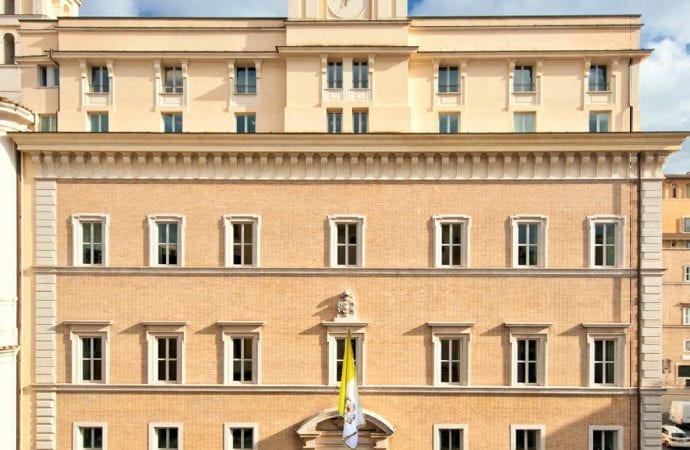Chilean Bishop Seeks Management Training Amid Abuse Crisis Cleanup
By Elise Ann Allen
ROME - Living with acute poverty, inequality and the aftermath of what is arguably the Catholic Church’s worst clerical sexual abuse crisis, Chilean Bishop Tomislav Francisco Koljatic Maroevic is seeking what for some seem like a basic: Management training. The head of the Chilean Diocese of Linares, Koljatic is currently in Rome for a two-week intensive course as part of the Program of Church Management offered by the Pontifical University of the Holy Cross. And he’s using his vacation to do it. Speaking to Crux, Koljatic said he decided to enroll in the course because “I will learn important things for my life, for my work, for my duties, and basically to open my mind, to learn new things that are happening in the world now.” “That’s the most important thing for me, learning new things and improving my work as a leader and as a bishop in Chile,” he said. Like much of Latin America, Chile has been the site of ongoing protests expressing outrage at the country’s high levels of inequality and the cost of living. Though poverty rates have fallen in recent years, there is still a large disparity in income rates, which many argue is rooted in poor education systems. In addition to its economic and political woes, Chile has also been battered by ongoing clerical abuse scandals, which have been making waves for years, but reached a fever pitch in 2018 when Pope Francis backtracked on his support of a controversial bishop at the heart of the controversy, launched an in-depth investigation into the crisis, and summoned the entire episcopal conference to Rome. The meeting culminated in the entire bishops’ conference submitting their resignations to the pope after he chastised them for a collective mishandling of abuse cases and the subsequent cover up. In the aftermath, he accepted a number of those resignations and defrocked Father Fernando Karadima, the nation’s most notorious abuser priest. At both a national and diocesan level, Koljatic said “There is always a need to improve effectiveness and efficiency,” which are things he is hoping to accomplish through the course. “I come from a rural diocese, very beautiful, loving and generous, but very disorganized on an administrative level,” he said, adding that it is his goal to streamline the administration of his diocese’s institutions and implement best practices in order to make things organized and more transparent. Koljatic said he would also like to apply course materials to the parochial and educative contexts, so the quality of parishes and schools can be raised. To do this, Koljatic said he hopes to apply basic management skills such as going to “the essential,” the ultimate goal of a project, and defining clear ways of achieving it; otherwise bishops, pastors, and even lay leaders can spend years pursuing something that ultimately does not serve their parish or institution’s goal. For the Church, this goal is Christ. “What the Lord is asking of us, we need to make this clearer, and repeat it, evaluate it, and make it concrete,” he said. One topic currently being discussed that Koljatic said is particularly useful is when a leader wants to implement something, but the institution doesn’t budge. They key, he said, is trying to find the reason, whether it be fear or hesitancy to change entrenched methods, and the proper motivation to get things going. “There are very sensitive things, but extremely important for the efficiency of our management,” he said. Going back, Koljatic said he wants to focus on tackling poverty and inequality in his diocese, in addition to streamlining the administration. “How is it that after centuries of looking for justice and equality, we have not accomplished it?” he asked, perplexed. “They are macro problems, complex, which reflect the heart of every human being.” Pointing to Chilean Saint Alberto Hurtado, Koljatic called him “an apostle of social justice” who was able to take concrete actions in defense of those to him he ministered, building homes for abandoned children and the elderly. “He personally would walk the streets looking for them, to help them. It’s a question that involves culture, politics, and we have advanced a lot, thanks to God,” he said, but lamented that poverty is still increasing. The Church has always been on the front lines in these areas, he said, but stressed that “it’s a problem for the entire country,” to address. “These topics hurt us, worry us, make us uncomfortable,” he said, but voiced his hope that the Church can tackle the issues through better education, formation and administration. “Formation and testimony, this is what we can do,” he said. “And I think that we are making a good effort, we are happy, we are doing very good and interesting things in these areas.”
|
.
Any original material on these pages is copyright © BishopAccountability.org 2004. Reproduce freely with attribution.
